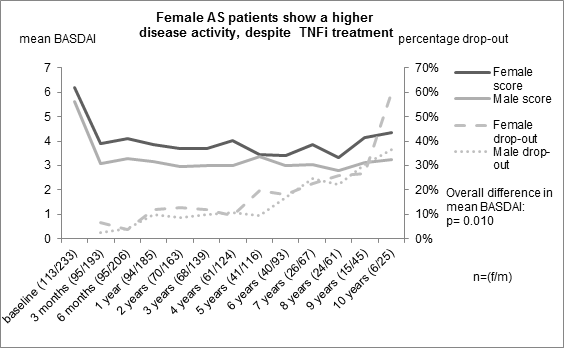Session Information
Session Type: ACR Poster Session A
Session Time: 9:00AM-11:00AM
Background/Purpose: Despite several observations of gender differences in TNF inhibitor (TNFi) treatment response and adherence in ankylosing spondylitis (AS) patients, limited studies were conducted. Our aim is to assess gender differences in TNFi treatment adherence and response in a longitudinal cohort study over a 10-year follow-up period in AS patients.
Methods: AS patients (fulfilling the modified New York Criteria) treated consecutively with TNFi were included in a prospective, observational cohort. Data were collected at baseline, screening, 3 and 6 months and thereafter every 6 months on demographics, lifestyle factors, inflammatory markers (C-reactive Protein (CRP)) and disease specific parameters (Bath Ankylosing Spondylitis Disease Activity Index (BASDAI), Ankylosing Spondylitis Disease Activity Score (ASDAS), Bath Ankylosing Spondylitis Metrology Index (BASMI)). TNFi response was defined by BASDAI50% response criteria (50% of the initial score or improvement of >2 points) and ASDAS response criteria (improvement of >1.1 points). Kaplan Meier Survival curves and Generalized Estimating Equations (GEE)-analyses were performed.
Results: In total 359 AS patients (33.4% females) were included with a mean follow-up of 5.1 years. Women showed a significant lower follow-up duration than men, 4.5 vs. 5.4 years. Patients who were lost to follow-up, were mostly still treated. Overall, females showed significantly higher disease activity scores, BASDAI (0.57 points) (figure 1) and ASDAS (0.27 points), compared to males over the entire follow-up period. According to both the BASDAI and the ASDAS response criteria, females had an overall significantly lower percentage of responders compared with males. In the secondary outcomes, females showed only a clinically relevant lower BASMI (higher mobility) than males (0.23 points).
Conclusion: Female AS patients showed a significantly lower follow-up duration, a lower improvement and a lower clinical response to TNFi according to the BASDAI and ASDAS response criteria.
To cite this abstract in AMA style:
Hoekstra S, Rusman T, Nurmohamed MT, van Denderen C, van der Horst-Bruinsma I. Gender Differences in TNFi Treatment Adherence and Response in As Patients: A Prospective Longitudinal Cohort Study [abstract]. Arthritis Rheumatol. 2018; 70 (suppl 9). https://acrabstracts.org/abstract/gender-differences-in-tnfi-treatment-adherence-and-response-in-as-patients-a-prospective-longitudinal-cohort-study/. Accessed .« Back to 2018 ACR/ARHP Annual Meeting
ACR Meeting Abstracts - https://acrabstracts.org/abstract/gender-differences-in-tnfi-treatment-adherence-and-response-in-as-patients-a-prospective-longitudinal-cohort-study/
